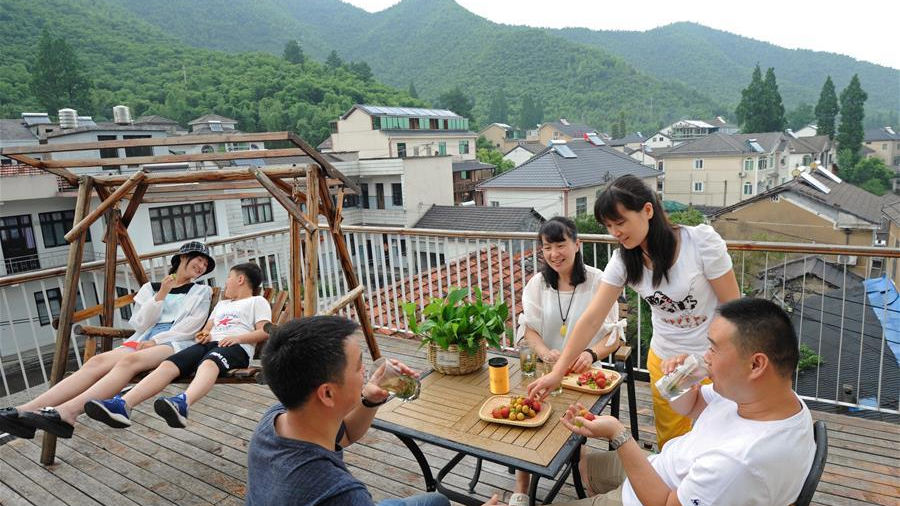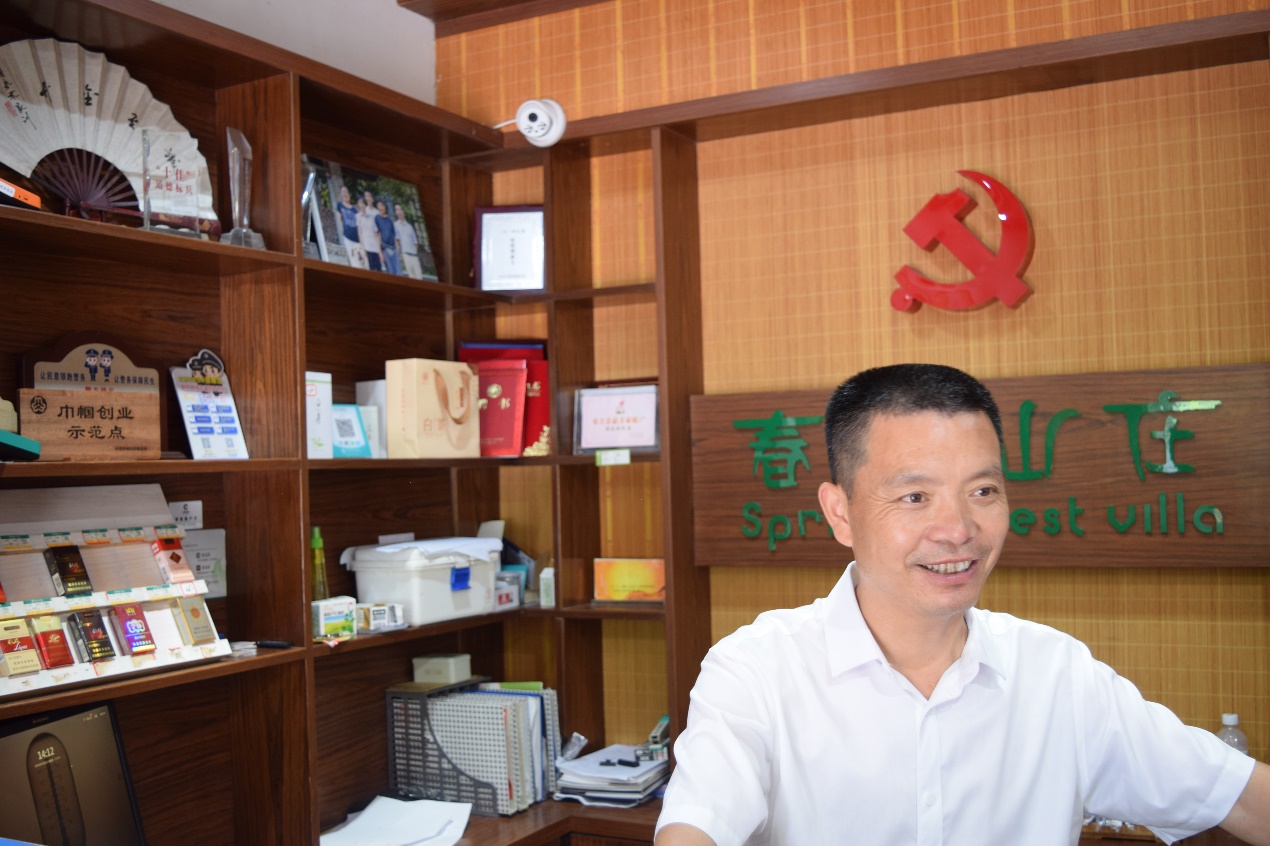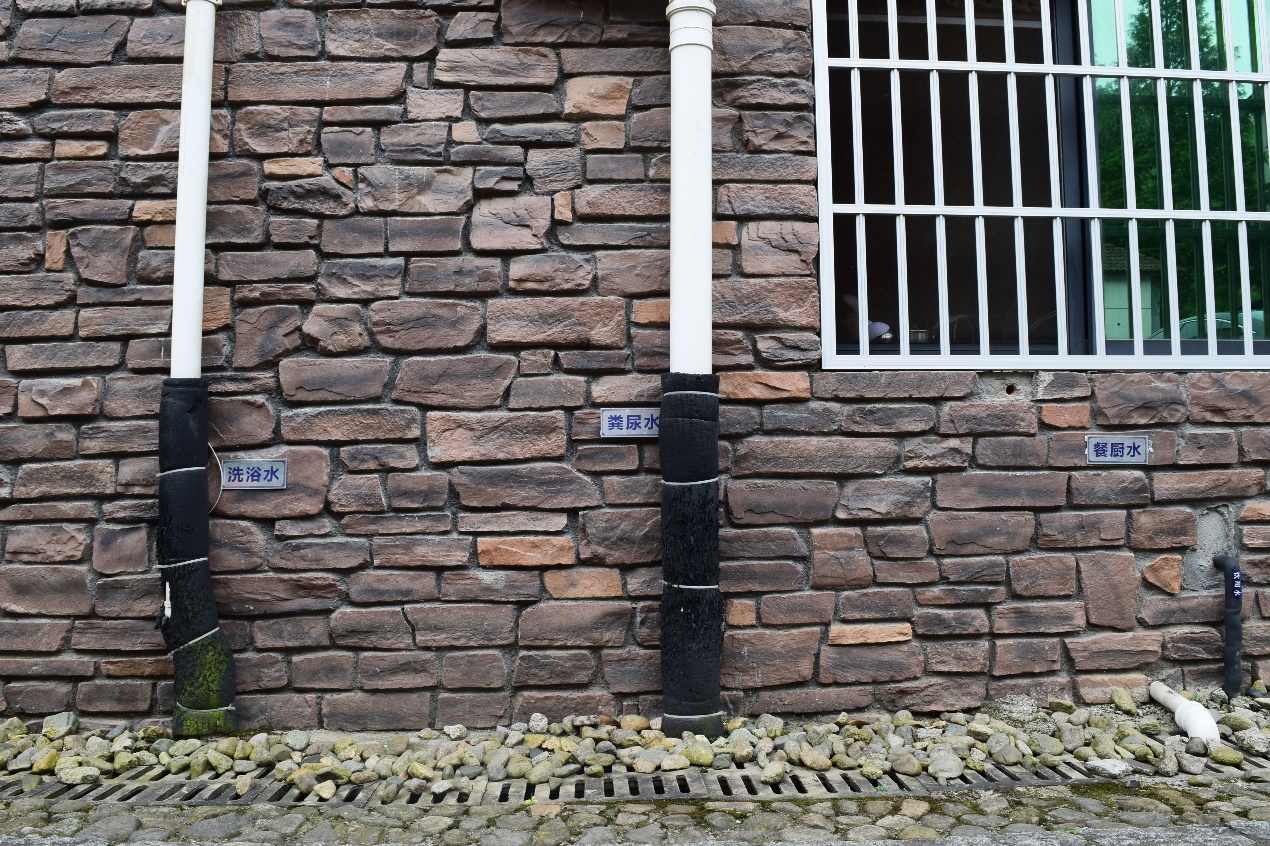
Homestay industries have gained popularity in Anji County, east China's Zhejiang Province. /Xinhua
Homestay industries have gained popularity in Anji County, east China's Zhejiang Province. /Xinhua
Editor's note: Tan Linyao, Li Jie and Du Yichen are students at the Communication University of China. The article reflects the authors' views and not necessarily those of CGTN.
Since the early 2000s, Anji County in east China's Zhejiang Province has made the green economy a top priority. The pain of economic restructuring to achieve this lofty goal has paid off and contributed to a takeoff of tourism in the last decade.
As a result, more and more young residents who migrated for better opportunities are returning to start their own businesses back home.
Pioneering returning youth
After authorities shut down cement plants and mines that were central to life in the area, the collective economic earnings of the village fell from 2 million yuan ($308,400) to 900,000 yuan in 2003. Pan Chunlin lost his job as a tractor driver in a local quarry that year and left in search of other jobs, leaving his wife to run a restaurant in the village.

Spring Forest Villa is the creation of Pan Chunlin. /Tan Linyao
Spring Forest Villa is the creation of Pan Chunlin. /Tan Linyao
Yucun Village in Anji County had determined not to prioritize economic development over environmental protection, particularly pollution from cement and mining. Besides the mine closure, drastic measures were taken to renovate the ecological environment, including restoring reservoirs and cleaning up rivers. A beautiful village was forming. This, and the development of the leisure and tourism industry, enticed Pan back to the village.
"I was the first one in the village to start an agritainment business," he said. Agritainment is a common form of farm-based tourism nowadays, but was very rare at that time. With no template to learn from, he invited restaurant chefs and hotel workers in the county to share their experience regarding management and service in the hospitality industry.
In 2006, Pan set up a website for his Spring Forest Villa and placed advertisements in media outlets in Zhejiang Province. "Calling out to attract tourists is the first step, while improving our service to win repeat customers is the key step," he said.
Today, Yucun Village is a national 4A-class scenic area. Many villagers have seized business opportunities like agritainment, homestay, ecological sightseeing and rafting. In 2019, the collective economic earnings of the village jumped to 5.21 million yuan, and the per capita net income rose from 8,000 yuan in 2005 to nearly 50,000 yuan.
Thanks to ecological improvement and brand strategy, the number of guest rooms in Spring Forest Villa has increased from three at the beginning to more than 20, and tourist arrivals have risen from hundreds to tens of thousands.
Pan now is in charge of a complete tourism chain. In addition to Spring Forest Villa, he also runs a travel agency and a cultural and creative company.

Yucun Village has careful sewage management. /Tan Linyao
Yucun Village has careful sewage management. /Tan Linyao
Homestays with open yards
Xiao Hu's coffee, Lao Hu's wine, Chun Lin's villa and Lao Biao's oil ... In Yucun Village, there is a street where each home is a guesthouse of sorts with open backyards. Walking along the street, you may understand why there is such a jingle. The scenery changes with steps in Hu Bin's homestay.
Cobblestones are paved to the gates, and clusters of flowers blossom. Jars of wine painted with opera facial makeup sit neatly in Lao Hu's wine shop and tourists are lured by an overflowing bouquet. Various bamboo woven products are displayed, dancing with the wind on the gallery in Chun Lin Villa.
Hu Bin, a designer who had already settled in Xi'an City, northwest China's Shaanxi Province, doubted he would return until he heard some praise of his home village from a neighbor in his adopted city. "[The neighbor] came back from traveling in Anji and was deeply impressed by a village called Yucun Village. I seriously doubted it because that's my hometown. And I knew what it looked like," Hu said.
So, he went back and saw the changes with his own eyes. The cement factories had been shut down, the bamboo industry and the forest economy were thriving; the management of sanitary facilities was even more elaborate than the urban area. Anji County had a completely new look.
When local officials mentioned that tourists were demanding better accommodation, Hu felt confident enough to refurbish his own old home into "Lyu Yuan Inn" homestay.
"Visitors come to get closer to the rural scenery, so the backyards must be opened," he said. Previous working experience and pre-market research made Hu realize that only by distinguishing homestays from farmhouses that tourists would stay overnight.
He took the lead in tearing down the walls and sharing the entire property with the neighborhood. What he did not expect was that the homestay's first-year income would be higher than his annual income in Xi'an.
Open yards have attracted tourists, and promoted connections within the neighborhood, leading villagers to tear down the "walls in their minds." After the construction of the first 15 open yards, more than 30 farmers applied to join the next round.

Hu Bin in his rural design workshop. /Tan Linyao
Hu Bin in his rural design workshop. /Tan Linyao
Features of agritainment and homestay
Every blade of green grass, with checkered blankets, wicker baskets and dried flowers that were put on the napkins, felt special as people schmoozed over a spread of beer, fruit, cake and pizza during the 2021 Anji Homestay Industry Conference.
The idea of outdoor picnicking at the conference was proposed by Zhou Feng, vice president of the homestay arm of the Anji Tourism Association. Zhou runs two homestay hotels and a coffee shop. He returned home to open his first homestay, Pinecone Homestay, in Shangshu Village in 2015 when the industry was just emerging. The satisfying business performance prompted Zhou to take over an old hydropower station and renovate it into a homestay on the theme of hydroelectric power, featuring a seasonal outdoor swimming pool, two generator sets, and four rooms. Zhou's homestay is popular among travelers, especially those from nearby cities like Shanghai and Hangzhou.
Anji County saw potential in the homestay industry from Zhou's business model and soon set up the Homestay Association.
When Zhou returned to his hometown to take care of his parents, he never expected a homestay business success. His businesses also have benefited from Anji's continuous improvement of entrepreneurial conditions.
According to Yu Xiaoping, deputy secretary of the Yucun Village Party Branch, live streaming, coffee bar and homestay hotels are popular startups. "Many local young people, as well as students studying abroad, have started up their own business back in Yucun Village and explored the special resources of the village," Yu said.

